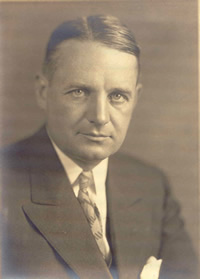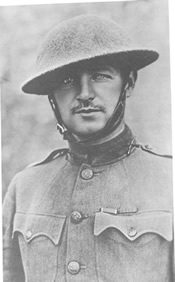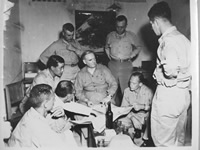An Interview with Douglas Waller on Wild Bill Donovan
Q. In a nutshell, what is Wild Bill Donovan about?
We’re really talking about three stories in this book: the tale of a heroic figure whose life was filled with personal tragedy, a spy drama that could be ripped from today’s headlines, and a story of political intrigue at the highest levels of government. For two years, I rooted through archives all over the United States and in England, and uncovered thousands of pages of newly declassified documents, which paint a riveting and revealing portrait of General William J. “Wild Bill” Donovan, the World War II spymaster in charge of the Office of Strategic Services and the intellectual father of today’s CIA. Donovan was a mythic hero—he won the Medal of Honor in World War I—but his life was filled personal drama and heartbreak. This book takes you inside the OSS’s spy missions—with new details about operations to topple Adolf Hitler, to steal secrets from the Axis, and even to snoop on our wartime allies. I’ve also unearthed new revelations about secret plots by the Pentagon and J. Edgar Hoover’s FBI to destroy Donovan and his organization. If you asked me to write a novel, I’d have a hard time creating a character as compelling as the real Wild Bill Donovan or a story as exciting as the life he actually lived.
Q. Why did you decide to write this book?
I’m intrigued by controversial historical figures, leaders who provoke strong opinions about them—pro and con. My previous book was on General Billy Mitchell, the father of the Air Force, who was a military maverick during the “Roaring Twenties,” a guy people loved or hated, and who was eventually court-martialed for being insubordinate in advocating airpower as a new weapon of war. Donovan was much in that same mold. Interestingly, Donovan attended Mitchell’s court-martial, which became a media spectacle in Washington. Like Mitchell, no one was neutral about Wild Bill Donovan. His loyalists thought he was a god. His enemies thought he was a rogue spymaster and a devious empire builder. And the new ideas Donovan advocated—such as setting up a national spy service and launching unconventional covert operations—were highly controversial in the 1940’s. In fact, Donovan’s legacy is still intensely debated by historians today.

Q. So who is Wild Bill Donovan?
He was the son of a poor Irish Catholic family from Buffalo, New York, who married into Protestant wealth. He fought bravely in World War I, where he won the Medal of Honor. He made millions as a Wall Street lawyer until Franklin Roosevelt asked him to be his strategic intelligence chief. It’s remarkable that FDR tapped Donovan considering that he was a Republican and Roosevelt was a Democrat and the two had had some fierce political battles in New York. But Donovan was the only one who seemed to Roosevelt to be thinking seriously about how to set up a worldwide foreign intelligence service, which FDR desperately needed as World War II approached. So he made Donovan head of what eventually became known as the Office of Strategic Services.

Q. What kind of person was Donovan?
Donovan was a man of boundless energy, creativity and enthusiasm. He slept five hours or less a night, speed-read at least three books a week, was deeply religious, and enjoyed the excitement of combat. He was also soft-spoken, rarely showed anger, hardly ever drank alcohol, and didn’t smoke. But though he was a charismatic leader, whom his agents in the field would follow almost blindly, Donovan was also a chaotic manager who drove his senior administrative aides nuts. At home, he spent money lavishly, with no concept of a family budget, which drove his wife crazy. In running his spy agency, Donovan was open to almost any new idea and willing to have his OSS tackle practically any operation, no matter how wild or risky it might be.
Q. What new information did you dig up?
I found a lot of interesting new details. For example:
- In Europe, Donovan mounted a broad covert program to topple Hitler or have him assassinated. Toward the end of the war he even toyed with the idea of sending out OSS death squads to kill the Führer and other top Nazis. He eventually abandoned the assassination project believing it would be better to capture Hitler and other German bigwigs like Hermann Göring alive.
- In Asia, Donovan launched a top-secret operation, codenamed the “S Project,” to spy behind the back of America’s ally in China, Chiang Kai-shek. Donovan’s cover was a newspaper an American publisher set up for him in Chunking. OSS agents posed as reporters and filed reports to Donovan’s agency along with stories for the paper.
- Donovan complained, with good reason, that he spent as much time fighting political enemies in Washington as he did the Axis abroad. J. Edgar Hoover, his most bitter rival, had his FBI agents spy on the OSS–and on Donovan practically until the day he died. Toward the end of the war Hoover, for example, had an agent pass a rumor to Harry Truman that Donovan was having an affair with his daughter-in-law. I found no evidence that the rumor was true. But Donovan did have a number of affairs with other women, which became common knowledge in Washington.
- Truman closed down the OSS after the war because he didn’t trust Donovan or particularly like him. The rumors Hoover peddled weren’t the deciding factor. Top Pentagon intelligence officers also fought fierce bureaucratic battles with Donovan. During the war they formed a highly secret Army spy unit behind Donovan’s back, which carried out espionage operations not only against the Axis but also kept tabs on the OSS. Toward the end of the war, that secret unit, nicknamed the “Pond,” managed to get a 59-page report to Truman’s desk accusing Donovan of running a rogue agency–guilty of everything from launching botched operations to staging a sex orgy.
- Donovan was a visionary, whose OSS often recognized future threats before others did. For example, as Truman was closing down his organization in the fall of 1945, Donovan’s analysts were preparing a report warning that nuclear terrorists might one day try to sneak an atomic bomb into a U.S. city and detonate it. It was a remarkable report considering the bomb just dropped on Hiroshima was practically the size of a small car. But the CIA and other government agencies to this day are still grappling with the problem of how to stop a nuclear terrorist attack in the United States.
Q. Where did he get the nickname “Wild Bill”?
Donovan was a stern taskmaster when he led an infantry battalion in World War I. After running his men with full packs through one particularly brutal three-mile obstacle course to toughen them up before they saw combat, they collapsed to the ground gasping for air. Donovan, who had just turned thirty-five and had carried the same load on his back through the course, shouted at them: “What the hell’s the matter with you guys? I haven’t lost my breath.” From the back, a soldier shouted back: “But hell, we aren’t as wild as you are, Bill.” From that day on, “Wild Bill” stuck.

Q. What’s notable about what Donovan accomplished with the OSS?
Donovan was fighting a covert war against the Axis at the same time he was building up his spy organization to fight it. That alone is not noteworthy. The United States military was so unprepared for World War II all the leaders were building up their force while fighting the war at the same time. But the army, navy and air force at least had some equipment at the start and a small cadre of soldiers, sailors and airmen. Donovan started from scratch, or from what he liked to call “minus zero.” His spy force at the beginning consisted of one person—Donovan. In the beginning, he was like a player at a pick-up basketball game recruiting agents and mounting operations with whatever was at hand. A lamp company agreed to feed him intelligence its employees stumbled across making sales calls overseas in Axis-controlled countries. Kodak camera clubs fed him photos its members had taken on vacations abroad of militarily important sites before the war. An airline loaned him ticket agents who worked in its Africa hubs to feed him reports on German U-boats they spotted off the Ivory Coast. That last operation was code-named “Cigar.” But gradually, Donovan assembled a force of professionally trained spies, commandos and intelligence analysts, which numbered over 10,000 by the end of the war and operated in every part of the world. That’s quite an achievement.
Q. What were some of the other things that struck you as interesting during your research?
How much history does repeat itself. How much the operations the OSS carried out more than sixty years ago mirror the operations the CIA carries out today—both the successes and the failures. For example, before the Iraq war the CIA thought it had valuable intelligence from an Iraqi defector code-named “Curveball,” which would prove that Saddam Hussein was producing biological weapons. Curveball, who claimed he’d worked as a top chemical engineer in Iraq, turned out to be a con artist and his allegations were false. During World War II, Donovan thought he had a silver-bullet agent penetrated deep inside the Vatican, who was feeding him transcripts of Papal conversations and intelligence on Japanese peace feelers conveyed through Catholic envoys. His code name was Vessel and he turned out to be an Italian pornographer with a vivid imagination, who fabricated intelligence reports to feed to the OSS.
Q. You say Donovan was the father of the CIA. How so if Truman shut him down?
Truman did close the OSS. But realizing he needed a national intelligence service to spy on foreign threats, Truman in 1947 formed the Central Intelligence Agency. Donovan wanted to lead the CIA, but Truman would never consider that and his successor, Dwight Eisenhower, would also not name Donovan CIA director. But though Donovan’s organization didn’t survive after the war, his idea for a postwar intelligence service did. The CIA Truman formed is remarkably similar to the postwar intelligence service Donovan proposed. Moreover, as I write in the book, Donovan’s OSS was “the Petri dish” for the spies who later ran the CIA. Allen Dulles, Richard Helms, William Colby and Bill Casey—who all became future CIA directors—worked for Donovan in the OSS and honed their clandestine skills under him.
Q. What can Wild Bill Donovan tell us about the CIA and the need for intelligence today?
American presidents today need a national intelligence service to monitor political developments and threats abroad, just as much as Franklin Roosevelt needed one in his day. The country needs secret agents with “disciplined daring,” as Donovan advocated before the United States entered World War II. The risk taking, the unconventional thinking, the élan and the esprit de corps of the OSS still permeate, to a degree, the CIA today. But presidents have to keep their eyes wide open and their hands firmly on the controls of the CIA. The OSS had its successes during the war, but it also had its intelligence failures as all spy agencies do—some of them spectacular failures, as I chronicle in the book. The same is true with today’s CIA. The delusion that covert operations can produce dramatic results, that legal or ethical corners can be cut to serve a higher cause infected the OSS and it has plagued the CIA in years past. Even so, Donovan “was one of the men who shaped modern warfare,” as I write at the end of my book. And that makes him an important person in our nation’s history.

Donovan in Xian China